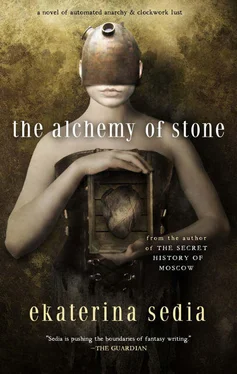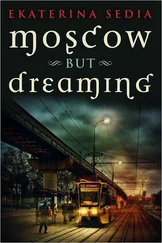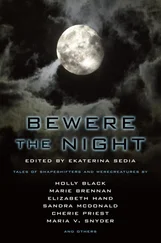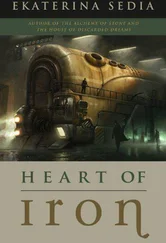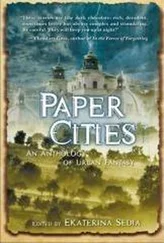Mattie shared the news with Niobe over breakfast—that is, Niobe was eating breakfast, and Mattie was sitting at the table in solidarity.
Niobe shook her head. “They will rebel, especially with the Duke so gravely ill.”
“How do you know?” Mattie asked.
Niobe shrugged. “There’s only so far you can shove a person until they shove back. I’ve seen it happen before.”
“What will happen?” Mattie whispered.
“Riots, probably. If the mechanics are smart, they’ll send enforcers right away to quell them before they even start. Give people money, double the miners’ wages. If not… if the miners rebel and quit, the city will grind to a halt without coal.”
Mattie was about to answer when someone knocked on the door. Only Loharri knocked with such arrogant insistence, and Mattie went to open. To her surprise, it was Sebastian.
“The gargoyles told me you were looking for me,” he said.
Mattie clicked along with a greater sense of determination than ever. Iolanda’s request receded on her mental landscape, its bothersome shape pushed deep and wedged between other concerns she did not want to think about just yet; it fit right next to her uneasy curiosity about Loharri and the dead boy’s hair, two thoughts caught together like the teeth of two interlocking spur gears.
Instead, she worried about the gargoyles and Sebastian, who had become, unofficially, her ward along with Niobe. There was no reason for Mattie to protect Sebastian and to tell him that the mechanics were interested in his whereabouts and that the enforcers were eager to arrest any easterner and hand him over to the Soul-Smoker. But still she felt compelled—for the vague but persistent feeling of kinship she felt for his mother. When Beresta had broken through the chorus of voices shouting through Ilmarekh’s mouth, it was only to say, “Find my son. He lives in the eastern district.” At the time, Mattie assumed that Beresta’s tortured whisper was for Mattie’s benefit, to help her sort out the gargoyles’ business; now she was not so sure. She felt as if Beresta had entrusted her son to Mattie’s care from beyond the grave, and she couldn’t very well ignore the request.
But her place was getting crowded. Between Niobe and her bed by the fireplace and Sebastian’s large frame curled up in the corner of the laboratory, by the waste drain, there was barely enough place for Mattie to stay upright, let alone pace, and she spent her days working at the bench, pulverizing and sublimating stone, and running outside to buy food for her visitors. Something had to change soon; and she needed advice.
She avoided Iolanda for now, and Loharri was the last person she wanted to alert to the nature of her hesitation and Sebastian’s presence. When she closed her eyes—rather, retracted them into her head to give them a rest from constant stimulation—the visions of hair plagued her. She saw the dead boy’s hair, curled up like a sleeping snake against the naked smooth skin of Loharri’s stomach, and Loharri’s and Iolanda’s strands, twined together in a deadly betrayal masquerading as love. Mattie shivered.
She put her shoes on and headed for the door.
Sebastian woke up. “Where are you going?” he said in a voice rough with sleep.
“Out,” Mattie said.
Sebastian sat up, his face gathered in a suspicious frown. Mattie had learned most of his expressions, and this one was as familiar as his smile. The blueprints of his face wedged deep into her memory, like the alchemical recipes she never forgot because she mustn’t. “Out where?”
“To talk to your mother,” Mattie said, softly. “Keep quiet— you’ll wake up Niobe.”
“Can I come too?”
“You know you can’t. But I will give her your regards. Any questions I should ask her?”
Sebastian shook his head, his face relaxing, pensive. “That wouldn’t be right. The dead are dead. Aren’t they?”
“Not until the Soul-Smoker is dead.” Mattie headed for the door.
The night city embraced and buoyed her, the air sweet and blue and dense like water sloshing in the Grackle Pond, mysterious and forbidden. The streets seemed different, the buildings twisting and leaning dangerously into the streets, their shuttered windows distorted in an inaudible moan. A few times Mattie worried that she had lost her way somehow—even the familiar landmarks acquired a menacing air. It was a while before Mattie noticed that the streetlamps had remained unlit—no doubt, the mechanics had braced for the shortage of coal.
It was windy outside the gates—the open blasted earth afforded no cover for the lashings of the gale, and Mattie had to wrap her skirts around her legs as tightly as she could, afraid that they would catch the wind like sails and carry her away, into the dark sky salted with the rough crystals of the stars. Loharri had told her that there was no air between the stars and this is why people couldn’t live there, but Mattie did not need to breathe, and she imagined herself floating in the black void, only her puzzled memories for company.
She hurried up the hill, toward the shining beacon of the lit window and the sweet smell of opium smoke the wind brought to her.
Ilmarekh was not surprised at her visit—as soon as she knocked on the door, he called out, “Come in, Mattie.”
She entered. “How did you know it was me?”
“Who else would visit me in the middle of the night?” he answered.
“The enforcers.”
He pointed to the previously vacant corner of the room, where a small portable telegraph gleamed with its brass knobs and copper rods. “They need me so often, they installed the machine. I hear it go off, I just head for the jail.” He heaved a sigh. “I don’t like this, Mattie—every time I tell them the soul was hiding no secrets, they just laugh and tell me that they’ll keep looking.”
“I’m so sorry,” Mattie said. She meant the souls of the innocents and Ilmarekh himself. “Can’t you refuse?”
“They will kill them anyway,” he answered. “Or the jail will. This way, they’re safe with me. And they never lack for company. I listen to the stories they tell, Mattie—what stories! I didn’t know how different the world was, and how beautiful—they show me cities of white stone and golden roofs, they show me gardens so fragrant, my head swims. And the sea, Mattie, the sea! Have you ever seen it?”
“No,” she answered. “I want to.”
“You should. You’d think it’s just like the Grackle Pond but bigger, but it’s nothing like that at all. It has waves—so big!—they rise like solid walls of green glass, heavy with threat and exhilaration. It changes color—from blue to green to black—in seconds, and it is the most beautiful thing one can imagine, especially when the waves are breaking on the shore, topped with white foam.” Ilmarekh clasped his birdlike hands to his chest, overcome with feeling.
Mattie looked away. “I’m glad you’re getting something out of it.”
Ilmarekh’s smile faded. “I’m not the only one.”
Mattie felt immediately sorry—she thought that for a soul sentenced to death even a temporary home shared with hundreds of other inhabitants, even a small delay was of benefit. “I’m sorry,” she said. “I didn’t mean it like that.”
Ilmarekh shrugged, and sat down on his mattress. “Of course you did. I don’t suppose I blame you.”
There was no point in blaming him for carrying out the decisions others had made, and Mattie sat next to him. “Can I talk to Beresta?”
“She hasn’t been talking at all lately,” Ilmarekh said. “It happens sometimes—the souls who have heard too much cocoon themselves off, build a wall around themselves, and I cannot reach them.”
Читать дальше
